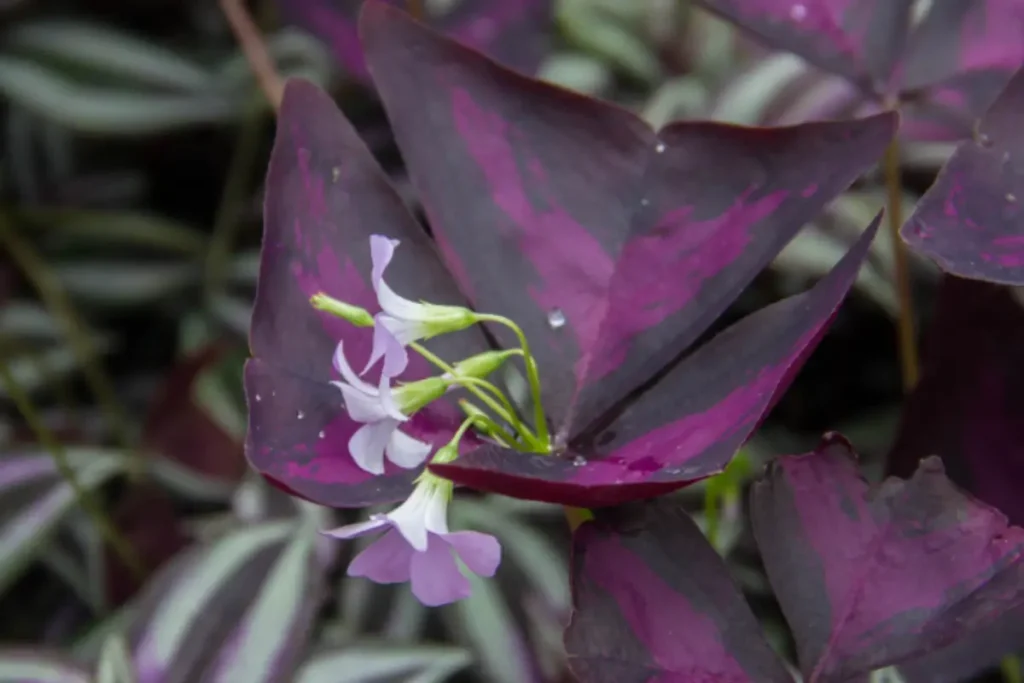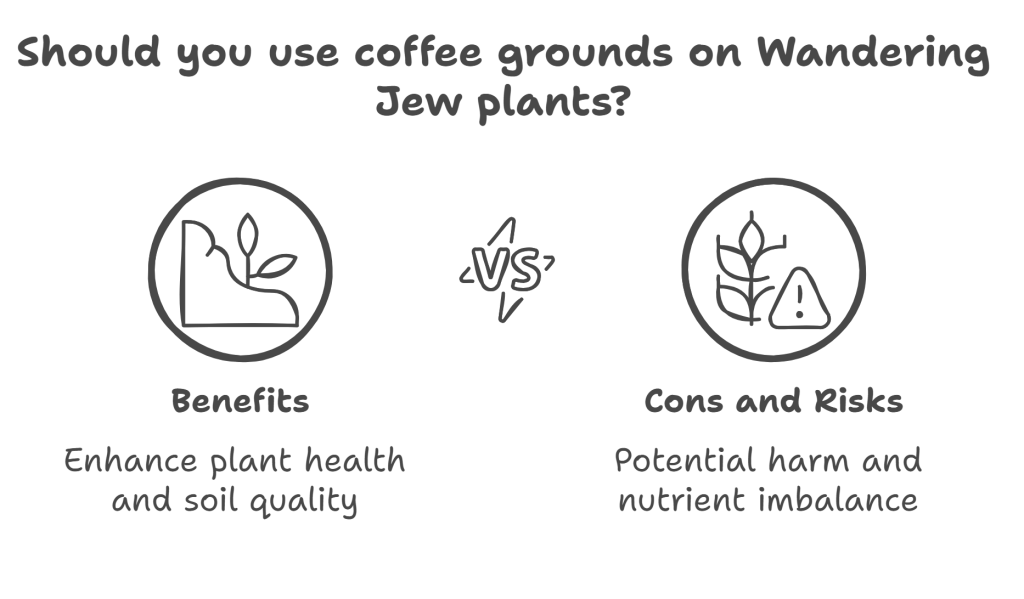Many people use coffee grounds as a natural fertilizer, but are they good for Wandering Jew plants?
Coffee grounds can be good for Wandering Jew plants if you use them correctly. They give nutrients, improve the soil, and help good bacteria. But if you use too many, they can make the soil too acidic, cause mold, or stop the plant from getting other important nutrients.
In this guide, I’ll explore how coffee grounds can help or harm your Wandering Jew plants, and how to use them safely. Plus, I’ll share tips on other ways to care for your plants.
What Is a Wandering Jew Plant?

Wandering Jew plants (Tradescantia zebrina, Tradescantia fluminensis, Tradescantia pallida) grow fast and show off striking purple and green leaves. They thrive in bright, indirect light and need well-draining soil to prevent root rot.
Essential Nutrients for Healthy Wandering Jew Plants
To stay healthy, Wandering Jew plants need:
- Nitrogen (N): Helps the plant grow strong, green leaves.
- Phosphorus (P): Supports the roots.
- Potassium (K): Strengthens the plant.
- Well-draining soil: Helps excess water drain away, reducing the risk of root rot.
Coffee Grounds as Plant Fertilizer
What’s in Coffee Grounds?
Coffee grounds have:
- Nitrogen: Helps the plant grow lots of leaves.
- Phosphorus & Potassium: Help the plant grow and flower.
- Organic matter: Makes the soil better.
- pH properties: Fresh coffee grounds are acidic (pH 5.5-6.8), but used grounds are more neutral.
How Coffee Grounds Affect Soil
- Acidification: Wandering Jew plants like slightly acidic to neutral soil (pH 5.5-7.0). Too much acidity can harm the plant.
- Soil Improvement: Coffee grounds help the soil retain moisture and air.
- Microbial Benefits: They help good bacteria break down the organic matter in the soil.
Coffee Grounds on Wandering Jew Plants

Benefits of Using Coffee Grounds
- Provides Nutrients: Coffee grounds add nitrogen for healthy leaves.
- Improves Soil: They help soil keep moisture and air.
- Encourages Microbial Growth: They support helpful bacteria.
Cons and Risks of Coffee Grounds
- Over-Acidification: Too much acidity can harm the plant.
- Risk of Mold: Coffee grounds can hold moisture, leading to mold growth.
- Nutrient Lock: Too much nitrogen can block other important nutrients.
Best Practices for Using Coffee Grounds on Wandering Jew Plants
How to Apply Coffee Grounds Safely
- Compost First: Mix coffee grounds into compost to reduce their acidity.
- Use sparingly: Limit to 1 tablespoon per month to prevent overfeeding.
- Mix with Soil: Blend coffee grounds into the soil for an even spread.
- Dilute Used Coffee: Use brewed coffee diluted with water (50/50) for a mild fertilizer.
Alternative Organic Fertilizers
- Banana Peels: Add potassium for stronger plants.
- Eggshells: Provide calcium for healthy cell growth.
- Fish Emulsion: Gives plants a balanced mix of nutrients.
Common Mistakes
Signs of Overuse
- Yellowing Leaves: This could be from too much nitrogen or an acid imbalance.
- Slow Growth: Too many coffee grounds can make the soil too compact for roots to grow.
- Mold and Fungus: Mold on the soil surface could mean you’ve used too many coffee grounds.
How to Fix Issues from Excess Coffee Grounds
- Flush Soil: Water the plant deeply to wash out excess acidity.
- Adjust Soil pH: Use garden lime or crushed eggshells to balance the soil.
- Switch Fertilizers: Try a balanced organic plant food instead.
FAQs About Wandering Jew & Coffee Grounds
Do Coffee Grounds Make Wandering Jew Plants Grow Faster?
Coffee grounds provide nitrogen, which helps leaves grow. However, too much can weaken the plant’s stems and cause nutrient imbalances.
Can I Use Leftover Brewed Coffee on My Wandering Jew Plant?
Yes, but dilute it with water (50/50) to avoid making the soil too acidic.
How Do I Test My Soil’s Acidity Before Using Coffee Grounds?
You can test your soil with a simple DIY method using vinegar (for alkaline soil) or baking soda (for acidic soil). For better accuracy, use a soil pH meter.
Are There Any Plants That Should Not Get Coffee Grounds?
Yes! Avoid coffee grounds on succulents, cacti, and lavender, as they prefer drier, more alkaline soil.
How Long Do Wandering Jew Plants Like Coffee Grounds?
Wandering Jew plants can benefit from coffee grounds occasionally, as they provide nutrients, but don’t overuse them.
What Plants Don’t Like Coffee Grounds?
Plants like rosemary, lavender, and thyme generally don’t like coffee grounds due to the acidity.
Do Wandering Jew Plants Like Coffee Grounds in Winter?
It’s best to limit coffee grounds in winter, as the plant’s growth slows and it doesn’t need as much fertilizer.
Wrapping It Up
Coffee grounds have useful nutrients, but they can also change the pH of the soil and affect your plant’s health. Compost coffee grounds first or use diluted coffee to avoid problems. Always watch your plant’s response and adjust care when needed.
Start testing your soil’s pH today and let us know in the comments how coffee grounds have worked for your Wandering Jew plants!
Want healthier Tradescantia plants? Check out our Wandering Jew Plant Care Guide: Expert Tips for Healthy Tradescantia
Happy Planting!






